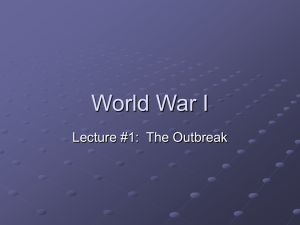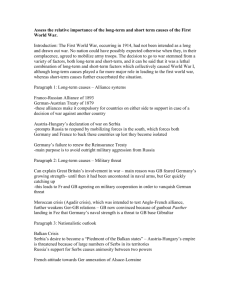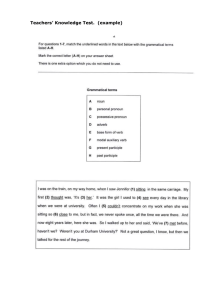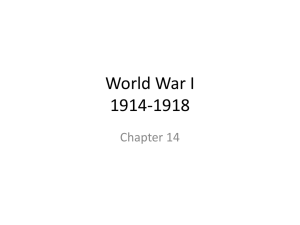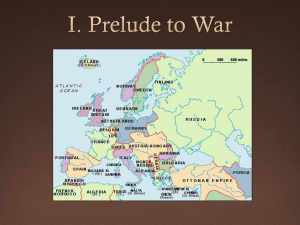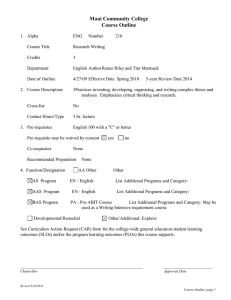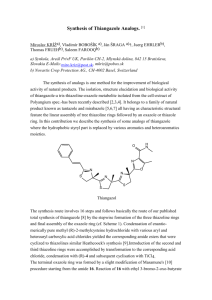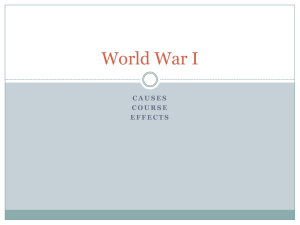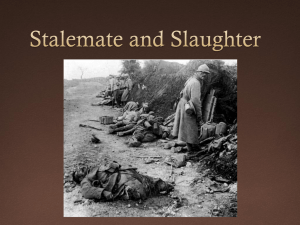Responsibility for WWI – Schools of thought
advertisement
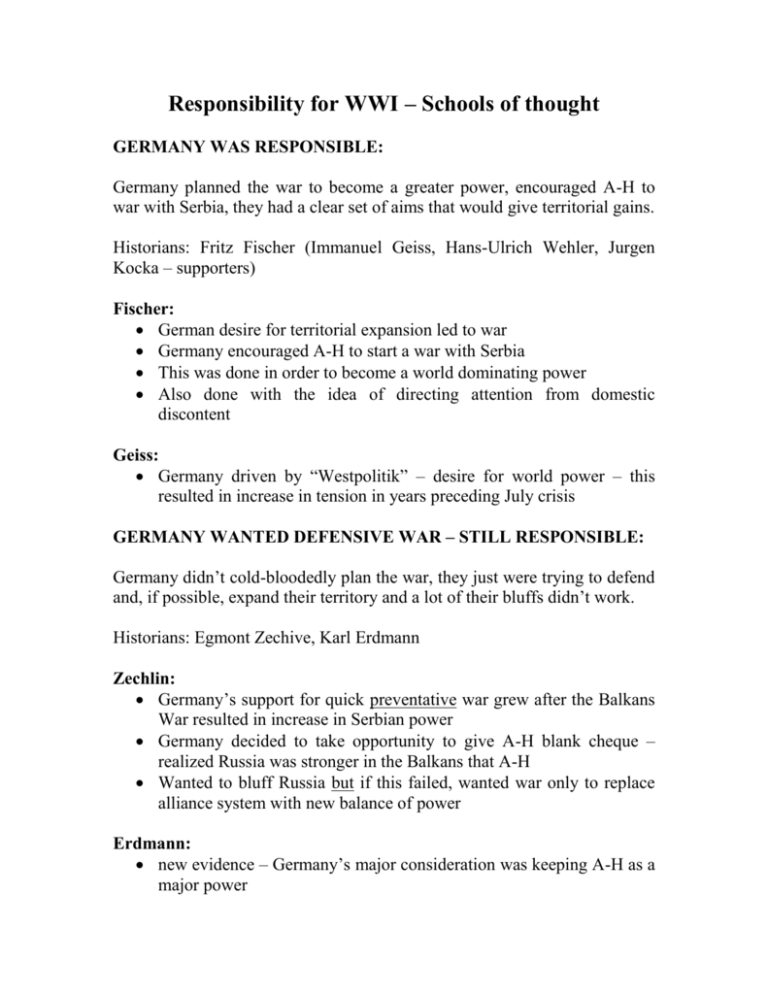
Responsibility for WWI – Schools of thought GERMANY WAS RESPONSIBLE: Germany planned the war to become a greater power, encouraged A-H to war with Serbia, they had a clear set of aims that would give territorial gains. Historians: Fritz Fischer (Immanuel Geiss, Hans-Ulrich Wehler, Jurgen Kocka – supporters) Fischer: German desire for territorial expansion led to war Germany encouraged A-H to start a war with Serbia This was done in order to become a world dominating power Also done with the idea of directing attention from domestic discontent Geiss: Germany driven by “Westpolitik” – desire for world power – this resulted in increase in tension in years preceding July crisis GERMANY WANTED DEFENSIVE WAR – STILL RESPONSIBLE: Germany didn’t cold-bloodedly plan the war, they just were trying to defend and, if possible, expand their territory and a lot of their bluffs didn’t work. Historians: Egmont Zechive, Karl Erdmann Zechlin: Germany’s support for quick preventative war grew after the Balkans War resulted in increase in Serbian power Germany decided to take opportunity to give A-H blank cheque – realized Russia was stronger in the Balkans that A-H Wanted to bluff Russia but if this failed, wanted war only to replace alliance system with new balance of power Erdmann: new evidence – Germany’s major consideration was keeping A-H as a major power both of above accepts G’s responsibilities but reject domestic importance and aggressive INTENT NATIONALISM This view argues that WWI grew from the struggle between Slav nationalism and A-H and the other powers were dragged into a third Balkan war. However there is also belief that the Balkans caused the occasion of war, but was not the cause. Historians: Martel, Joachim Remak, John Leslie, John Jowe Martel: WWI a clash between Slav nationalism and multi-ethnic A-H Remak: WWI was 3rd Balkan War that got out of hand – A-H and Serbia didn’t care if anyone else got dragged in and must take the major responsibility for the war – thus Slav nationalism and A-H response to it was key cause of WWI BUT Remak goes further – points out that Germany gave A-H a blank cheque, Russian mobilization meant localized war was impossible, France didn’t do enough to restrain Russia and was driven by desire for revenge over Alsace-Lorainne, which in turn was driven by nationalism – thus, everyone was at fault but the key underlying cause was nationalism Nationalism also made it possible to gain popular support for war in the lead up to it ALLIANCES The alliance system, which was supposed to help peace, turned a local quarrel into a general war. OR The lack of a fully effective balance of power – not it’s existence caused the war. Historians: Bernadette Schmitt, A.J.P. Taylor, James Joll Schmitt: July crisis was attempt to decide balance of power between Triple Entente and Triple Alliance alliances then converted localized war into general one BUT A.J.P. Taylor: claims that alliances were fragile – couldn’t be the cause of major war major powers made plans based on alliances but each nation made decision to fight on national interest MILITARISM, ARMAMENTS AND WAR PLANS A view that the arms race (escalation of) brought about the war. There were also military aims and a want for a balance of power. There is also a theory where the military planners who caused the fast-mobilisation are to blame. Historians: Michael Howard, Niall Ferguson, LFC Turner, AJP Taylor Howard: each armament increase before the war is seen as a threat – increase in mutual fear and suspicion BUT argument that an increase in arms expenditure led to war has been criticized – A-H spent least of GDP on war (1.9%) yet was determined to fight Ferguson: role of arms race has been greatly exaggerated – Britain spent most and wanted war least Taylor: it was plans for war that were significant – considerations within mobilization were major reason – Russia could only mobilize fully which led to Schlieffan Plan, which led to France and Britain being involved – this has been criticized – leaders were taking major decisions, not generals IMPERIALISM That WWI was caused by the imperial rivalry and the growth of empires. However, these claims have never been fully backed, as there is not enough evidence to support that there would be economic growth as a result of the war. Historians: Marxist writers, Vladimir Lenin has been perceived as creating sense of tension and competition amongst European nations Zilliacus: sees foreign policies as being by business interests – war was caused not by treaties, etc, but by need to defend imperial interests however, no record of any business interest abdicating war – Marxist view generally rejected COLLECTIVE RESPONSIBILITY The theory that all the Great Powers were to blame for the war. “Germany did not plot the war… a casualty of its alliance with A-H. A-H… acting in self-defence against the expansion of Serb nationalism. Serbia… believed that it would be forced to fight. Russia partly responsible… encouraged Serbia and mobilised troops. France can be blamed… for support in Russia. Britain… did hardly anything to restrain Russia or France.” (Fay) Historians who argue this theory: Sidney Fay, G.P. Gooch, Gerhard Ritter
